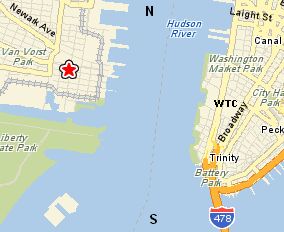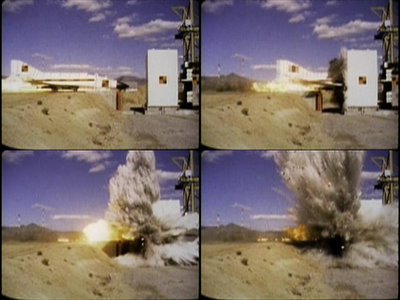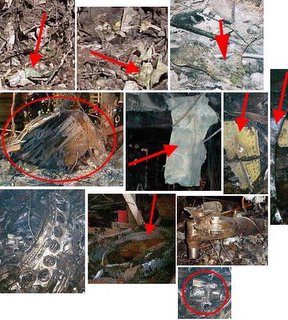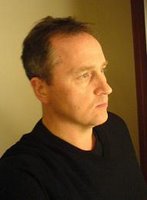 Scott Forbes is a Senior Database Administrator for Fiduciary Trust and used to work in the South Tower of the WTC. This interview with him began last September and was conducted through a series of instant messaging and e-mails. Scott can be reached at:
Scott Forbes is a Senior Database Administrator for Fiduciary Trust and used to work in the South Tower of the WTC. This interview with him began last September and was conducted through a series of instant messaging and e-mails. Scott can be reached at:scottforbes2002@hotmail.com
Killtown: Scott, you have an interesting story to tell. Where were you working the week before 9/11?
Scott Forbes: In my office on the 97th floor in WTC 2 (South Tower), as usual except that myself and a lot of my colleagues were also working the weekend of 9/8 and 9/9.
KT: Why were you working the weekend before 9/11?
SF: Because of a "power down" notified by the Port Authority. Power was being switched off for a 36hr period in the top half of tower and as I work for a Financial Institution and Bank in the Technology Group I was working on the shutdown and eventually the startup of all our systems.
KT: Was it unusual for you to be working on the weekend?
SF: I suppose at that time I would have been working one weekend in every 6 or 8 weeks, so it was not unheard of. Working in Technology you get used to working 'out of business hours.' I guess what was odd about this weekend was that as all power was going down then all of our systems were being shutdown. This was extreme and unprecedented.
KT: Who were you working for and what was your position there?
SF: Fiduciary Trust, an Investment Bank, who had just been acquired by the Franklin Templeton Group and I was (and am) a Senior DBA or Database Administrator.
KT: So you are an IT personnel?
SF: Yes.
KT: How long did you work in the WTC 2 before 9/11?
SF: I started in the company as a consultant in June 1998 and I joined full time in December 1998.
KT: During all this time, how many times did the WTC have a "power down"?
SF: None in Tower 2 that I was aware of. We had a backup Generator for our Data Center on floor 97 in the event of an unplanned power outage but it had not been used during my time in the company. You have to understand how unprecedented the power down was. To shutdown all of our financial systems, all inter-related and with connections and feeds to may outside vendors and suppliers was a major piece of work. Additionally, the power outage meant that many of the 'ordinary' building features were not operating, such as security locks on doors, cameras, lighting, etc.
KT: How many floors did this power down effect?
SF: I can't give you the absolute numbers, but I know it was the 'top half ' of WTC 2, so I'd say from floor 50 or so.
KT: Was there a power down in the WTC 1 also?
SF: Not to my knowledge.
KT: Did you think that was kind of odd that one tower (South) had a power down and the other one (North) didn't?
SF: Not really - I remember that we were notified some 3 or 4 weeks in advance by the Port Authority-NY/NJ that there would be a power outage - so we had to co-ordinate and plan efforts in the IT departments to ensure we had everything shut down in time and ready to restart. Frankly at the time I didn't think about WTC 1.
KT: What did the Port Authority say the power down was for?
SF: As far as I recall it was for re-cabling, though I don't remember the wording on official documents or the detail, as I wasn't in the Management Loop.
KT: What did they say the "re-cabling" was for?
SF: I understood it was something to do with the power supplies.
KT: Did you think it was odd that they had to power down for "re-cabling?"
SF: Well at the time I didn't question it -- neither did anyone else. We just got on with the work that needed to be done. There was a lot of mumbling and grumbling, I certainly remember that, and I got the Tuesday off in lieu of 9/11, so I was at home watching events unfold from my my apartment window on that day.
KT: You had gotten the day of on 9/11, was this because you worked the previous weekend?
SF: Yes.
KT: If your company hadn't scheduled you to work that weekend, would you normally have been at work that Tuesday?
SF: Yes and I was usually in the office at 7 am EST, so I would have been there for sure. In fact on 9/11 my first response after the first plane hit WTC 1 was to call my office and speak to my colleagues.
KT: Your company, Fiduciary Trust, is located on floors 90, 94-97, correct?
SF: Yes, we were located on those floors. The Executive Offices were on 90, 94-97 were Administration Offices, with the Data Center and Tech Staff on floor 97.
KT: Did you normally work mainly on the 97th floor, or did you work on all of those floors?
SF: 97 was my floor, but inevitably I was on all floors for staff meetings, etc.
KT: Had you or any of your colleagues ever heard or experienced a power down before?
SF: No, except when the bomb went off in the car park in '93.
KT: Did the Port Authority ever say if they were going to power down the bottom half of the WTC 2?
SF: No, not that I recall.
KT: I was reading an article about the WTC saying that it was not very modern in terms of it's high tech infrastructure. Is that true?
SF: Correct, not if you compare the WTC to recently built and opened buildings. It was a little dated and faded which I liked actually.
KT: Why is that?
SF: The building was retro, some of the features were so old, like the central heating and a/c systems, which were really really bad and inefficient.
KT: I read about how it was very expensive to heat and cool the towers.
SF: Yes, in summer the heat inside the building could be really bad. We had a manual way of setting up fans on desks to keep the air circulating around the floors.
KT: Besides the "power down" the weekend before 9/11, was there any other unusual activity going on related to the WTC? There was one guy, Ben Fountain, who worked on the 47 floor of the WTC 2 who said there was an unusual amount of evacuation drills. Did you experience any of those?
SF: We had regular fire/evacuation drills, but not an unusual number.
KT: How often were those and when was the last one before 9/11?
SF: I couldn't tell you the frequency or when the last one was held, I just can't remember, sorry.
KT: Back to the weekend of the "power down," when did they turn the power off and when did they turn it back on?
SF: Off on Saturday afternoon - around 12 noon I think - and back on at about 2 pm on the Sunday (my timings on this are hazy).
KT: When you were working these two days, did you notice anything suspicious going on in or around the WTC?
SF: Well there were several guys in overalls, carrying building gear, toolboxes, etc inside the building. Remember there were no security locks on doors or security cameras, so access was free unless a door was locked by a manual key. Seeing so many 'strangers' who didn't work at the WTC was unusual.
I'd make one other point at this juncture also, because of the power down backups of system were an absolute necessity and they would have been taken offsite for security. Because of the power outage all our systems backups had to be 100% valid and available in case of an emergency. These were taken offsite, like normal, for security.
KT: So the people you saw coming in and out of the building, did they have badges and what were their ethnic makeup, were they Arab?
SF: No ethnic consistency at all and I don't remember any badges or labels of any sort.
KT: Where did you see all these strange workers? Was it just the floors you were working on that Saturday and Sunday, or also in the lobbies and elevators and what floors were you working on that Saturday and Sunday?
SF: I was working on the 97th floor and as I recall I saw guys in the main lobby, on the ground floor and in the elevator lobby on floor 76. This was on the Saturday.
KT: You mentioned you didn't notice them wearing any badges. Is this unusual? I take it there must be a lot of construction going on in the WTC from time to time. Do construction workers not need identity badges?
SF: They would all need to have stick-on badges, with their photo and name. I can't remember seeing those badges or not.
KT: After 9/11, did anybody you worked with or know in the building also notice these strange workers running around on Saturday and Sunday?
SF: Well anyone who worked those days saw them. After 9/11, things were a blur.
KT: When did you know that you would have Tuesday, the day of 9/11 off?
SF: On the Monday, I was taking off Friday but I swapped it with a colleague, who got out on 9/11 unscathed fortunately.
KT: So you were scheduled to work that Tuesday?
SF: Originally yes, but I swapped a day off with a colleague, so I had Tuesday off and he was in the Office.
KT: So in a sense, and for a lack of a better word, you were really lucky to be off that day?
SF: Very lucky. Usually I was in the office at 7 am and having breakfast with colleagues in the 96th floor cafeteria by 8:30 am. In fact one of my colleagues was there in the cafe when the first plane hit the Tower 1. He watched it coming in over Manhattan.
KT: He saw it coming? How did you find this out?
SF: Well he survived and we talked about it often. We used to joke about the planes over Manhattan and that one day one would hit the Trade Center. He ran from the cafe and took his colleagues from his team and left the building. Had he not seen the plane with his own eyes, he and his team would have been far more relaxed I'm sure.
KT: Was this the same colleague you swapped days with?
SF: No.
KT: Can you tell us real quick where the colleague you swapped with was at the time of the plane crash and how he managed to escape?
SF: He was at his desk on the 97th floor, looking South toward the statue of liberty. He heard the plane hit the other tower and just picked up his backpack and left our tower by elevator. I had other colleagues who did not leave so quickly -- some survived, others did not.
KT: How many people from your company did not make it out of there that morning?
SF: 89 were lost I believe. 20 from my department. [See list]
KT: So a lot of these people must of been your friends and also colleagues you worked with and saw everyday at work?
SF: Yes, many close friends.
KT: One thing I have to ask is when I was reviewing those from your company who perished that day, it seemed to me that no high-level employees in your company -- such as managers, directors, VP's, etc -- were among the victims. Was I reading that right?
SF: Not quite. Certainly in my department six of the 20 were managers. However it is a statement of fact that no Directors or VP's were lost.
KT: Of the floors your company occupied in the WTC 2, floors 90, 94-97, were most of your executives on the 90th floor?
SF: Yes.
KT: Do you know if most of the executives from your company were in the building when the plane crashed?
SF: Frankly I don't know. I know some were absent from the building and some were in the building and escaped.
KT: Were you at home on 9/11? Can you tell us what you were doing up to the time you heard about the 1st plane crash?
SF: I was at home having coffee when I heard the 1st plane hit the North tower. I thought it was a car crash on the street below (I lived on the 15th floor) and so I went to the window and opened the blind to look down (the blinds were closed due to the bright sunshine) and there in front of me I saw the smoke coming from the North Tower.
KT: What did you immediately think about what happened to the North Tower?
SF: I thought it was explosion from the windows on the world restaurant, but I turned on my TV and coincidentally at the same time the news programme began showing the event from the northern direction and gave out the news that a plane had hit.
KT: Did the news say what kind of plane?
SF: A "passenger jet" I believe.
KT: Do you remember about how long it was after you heard the crash until the news said it was a passenger jet?
SF: Almost instantly.
KT: After you heard a plane had crashed there, did you think anything suspicious of it, or just a freak accident?
SF: No, I didn't think it was an accident - I was highly suspicious, so much so that I called the office, spoke to colleagues and told them to get out right away.
KT: Just to be clear, you were suspicious right away after the 1st plane crash into the North Tower and before the 2nd plane crashed?
SF: Yes.
KT: Can you elaborate why you felt suspicious right away?
SF: It just didn't seem right. Commercial passenger jets don't crash seemingly intentionally in clear bright sunshine in Manhattan.
KT: So it was mostly a "gut feeling"?
SF: Yes. Then when the second plane hit the South Tower, I immediately thought about the power down condition in the South Tower that previous weekend and I watched the second plane coming in over New York Bay from over Staten Island, miles away.
KT: Were you able to get a close look of the 2nd plane coming in, or did you just see it's silhouette?
SF: It would have been about 1.5 miles away from my apartment at its closest. I saw it for some time, not closely, but for some time.
KT: Were you able to make out what kind of plane it was, or from what airlines?
SF: No, I couldn't tell what kind of plane or what airline it was - all I could tell was that it was a two engine jetliner going extremely fast.
KT: Did you have any idea what type of plane it was (commercial airliner, military, large, small)?
SF: No, actually my naivety made me think it was a tanker of some kind, coming in to drop water on the flames from the North Tower!
KT: Let me back up a bit, after the 1st plane crash, did you try to call any of your colleagues in the WTC?
SF: Yes. I called the guy I sat next to -- his number was the first I could remember -- he answered and I spoke to him and one other. They had heard the crash, rushed to the windows and saw the smoke but didn't know what it was. I was able to tell them and I told them to get out right away.
KT: Did they leave right away?
SF: Some did and some didn't. Some took elevators and some took the stairs.
KT: Did you feel that you probably had helped save some of their lives by telling them to leave right away and did you happen to know anybody in the North Tower?
SF: I knew no one in the North Tower and I don't think I helped anyone. In fact in retrospect I wonder why I didn't call more people.
KT: The next question I want to get at is there have been lots of reports of people in the WTC's said that they heard popping noises, rumblings, and other noises associated to explosions going off in the buildings. Did anybody you have talked to that were in the WTC on 9/11 speak of this too?
SF: Not directly that I spoke to, but I am aware of one member of staff who was lost whose wife reported that he told her on the phone that explosions were going off.
KT: Do you have any idea at what time he was talking to her or what time he heard these explosions going off?
SF: Between 9:15 am and 9:58 am approx - you can read her account of the conversation in the New York Times archive [See: Edmund McNally]
KT: What floor was he on?
SF: 97th.
KT: There have been reports of explosions in the basements of both towers and video evidence shows damage in both lobby areas which looks a bomb went off. Did anybody you know who escaped from the South Tower ever mention any damage to the lobby area?
SF: No, apart from broken glass from the plane impacts and crashing elevators. Several elevators cables were broken/slashed so they crashed to the ground.
KT: Are you still in contact with anybody who escaped from the South Tower?
SF: Yes.
KT: Has any of these people, or anybody else who was in the South Tower for that matter, have come out publicly about the "power down" the weekend before or reports of hearing bombs in the building when they were inside?
SF: Many, many people have talked to me about the power down and one person was contacted by a journalist as a backup source for my information.
KT: Let's recap a little, you said you felt something wasn't right when the first crash happened and when the 2nd crash happened, you felt that this had something to do with the "power down" in the South Tower that you worked in. Did you immediately think it was an "inside job" at this point and did you think it just involved maybe the owners of the WTC, or did you also suspect that this may have also involved someone in the government?
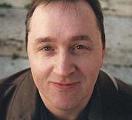 SF: I didn't think that one group specifically were the cause, but I immediately was very suspicious about the power down. The timing was so coincidental.
SF: I didn't think that one group specifically were the cause, but I immediately was very suspicious about the power down. The timing was so coincidental.KT: I guess at what point did you start to feel that the plane crashes were some sort of inside job? Did you think it was an inside job?
SF: Again that's putting it a little too specifically. I put together what I saw with my own eyes and the knowledge of the power down and came up with a great deal of suspicion on the "official" story. It just doesn't seem to be the total truth to me.
KT: When the towers came down, did that just create a ton of more suspicion for you?
SF: When the first tower collapsed, that's when my suspicion started.
KT: One aspect of 9/11 that probably has created the most suspicion the attacks for most people is the collapse of the 47-story WTC 7. Many people didn't even learn about this strange collapse until many months later when it first started appearing on conspiracy websites (that's how I learned about it!). Did you happen to witness the collapse of the WTC 7 from you apartment building and did you hear anything about it afterwards on your local NYC news?
SF: Yes, I was alerted by an item on TV (CNN I think) and when I looked out of the window I saw a new plume of smoke rising from the site. I did not see it actually collapse however.
KT: Did you see much news about this collapse immediately afterwards or ever see any video coverage of the WTC 7 collapsing on TV?
SF: I remember seeing coverage on CNN at the time and on other programmes and channels subsequently.
KT: Would you say there was a lot of follow-up news on the WTC 7 collapse in your area, or relatively few?
SF: Little -- it was considered only in context of the other tower collapses.
KT: When did you first start coming out in public talking about the "power down" in the South Tower and your general feelings of suspicion about the attacks?
SF: From day one, but more loudly about two months after when my company had rebuilt itself in a Disaster Recovery site in NJ.
KT: Who did you start talking to about it at first?
SF: My colleagues and friends.
KT: What was their reactions?
SF: Some were skeptical in the immediate aftermath in the midst of that very vengeful and angry reaction.
KT: Did any of them start to come around and take your story and thoughts seriously after everybody's initial anger and rage subsided a bit?
SF: Sure, some did and have, but many remain skeptical and frankly many do not want to revisit that time, as it was very painful.
KT: When did you go back to England?
SF: I came back to the UK in May 2003.
KT: When did you start trying to tell your story to government officials? Have you tried to contact the media also?
SF: I've sent emails and letters to the 9/11 commission and the Port Authority of NY/NJ, without response, and I've emailed, IM'd and spoken to several independent authors and broadcaster. No mainstream media outlets.
KT: So the 9/11 Commission and Port Authority never even contacted you back?
SF: No.
KT: Did that just make you feel that there might be a cover-up going on?
SF: Sure - that's natural isn't it - though it could just be inefficiency. All I am looking for is an acknowledgement that the power down did take place and that it has been investigated.
KT: So no "officials" have acknowledged the "power down" in the South Tower that you witnessed?
SF: Not that I know of.
KT: How many times have you tried to contact the 9/11 Commission or other officials?
SF: Three times in total.
KT: Has anybody else from your company or who witnessed the "power down" try to contact any officials?
SF: That I do not know.
KT: When did you try contacting alternative media outlets to try to tell your story?
SF: I entered a three or four line entry on a blog site in 2003. That was my first entry.
KT: Have any foreign news media or any of your local British media ever try to contact you about your story?
SF: Yes, recently I spoke face to face and on-camera with a Dutch Journalist, working on a documentary on 9/11 and I was interviewed by two English journalists also.
KT: Do you feel like the U.S. mainstream media has been less interested in your story than the foreign mainstream media?
SF: Yes, very much so.
KT: Any thoughts to as why?
SF: I feel that the US media and Americans in general have an over-sanitized and safe character. They are far less willing to be critical of their government and country than foreign media and individuals and this extends to the point of not questioning accepted half-truths. Also, 9/11 is now part of an American History that is cherished and almost Holy - to question it is to be traitorous.
KT: How interested has your alternative media and other foreign alternative media compared to the US alternative media about your story?
SF: I've spoken to English, Dutch and Australian journalists, as well as a number of American media-folk. I'm surprised that US media folk are not as aggressive - but then I am outside the US now.
KT: Do you feel more people in your country and the rest of Europe are more suspicious about 9/11 than most Americans?
SF: For sure! Let me put it this way, I am British working in US on 9/11. I was contacted by Police from London to interview me (debrief me), but none of my American colleagues were contacted by police or FBI or any agency. Kind of weird.
See also:
- Interview with Scott Forbes - George Washington's Blog
- April 19, 2004 - Killtown's 9/11 Coincidences & Oddities
